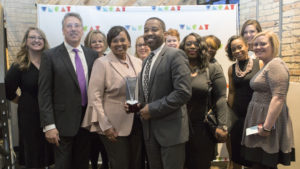Q&A with Bill Manns, President at Mercy Health Saint Mary’s
We sat down with Bill Manns, President at Mercy Health Saint Mary’s to discuss the organization’s priorities towards equity, and their partnership with WMCAT for the Adult Career Training program. WMCAT is thankful to have Mercy Health as a strong partner that works closely with our staff to ensure our adult students are being considered for externships, networking with Mercy Health staff, and looking at our graduates for potential positions as medical coders, medical billers, or pharmacy technicians. Mercy Health was given the Award for Imagination at this year’s iBall gala on March 22nd.
Q: What does an equitable workforce look like to you?
A: From my perspective, when I came to Grand Rapids a few years ago, the disparities between what the workforce looked like at the hospital and the community were stark. Having the workforce within the organizations reflect the community is critically important.
Q: In regards to employment, what made it clear that the community was disconnected from the hospital?
A: I was approached a number of times when I was at the barbershop getting my haircut – people would come up to me and hand me their resume and say, “Oh you’re the new president at Mercy Health Saint Mary’s, can you get me a job?” As many of you know, that is not the best way to get a job. From my perspective, it became important for us to develop a process that was fair and equitable. One that looked at people, not for the color of their skin but rather based on their skill set and ability to do the job.
Q: Why is it important for Mercy Health to create a more diverse workforce?
A: One of the things that we experience, unfortunately, in West Michigan is huge disparities of care. Often, communities of color don’t trust large organizations. They see people who work in those organizations that don’t reflect them or don’t look like them. If you can reduce that barrier and have people feel more comfortable coming into healthcare organizations, we strongly believe that they are more willing to get preventative care, they’re more willing to take care of themselves, and to trust that care giving organization. So, it is really important that the people who work within the organization reflect the community.
Q: To expand beyond Mercy Health, why is it important for West Michigan to work on this issue?
A: If West Michigan doesn’t work on this issue, the polarity between the “have” and “have nots” continues to increase. If you’re part of the “have nots”, you become incredibly desperate. While we might thrive in certain subsets of the community, the subsets that don’t have will have poorer healthcare outcomes, and they will have disparities to cause them to behave in ways we wouldn’t like. I think we would see crime go up and it just would not be good situation for the overall wellbeing of the entire community. It is incumbent upon us as leaders to step back and do the right thing for the entire community.
Q: How has partnering with WMCAT advanced your efforts?
A: The leadership at WMCAT and at Mercy Health have similar goals to see the entire community thrive and do well. We have been very creative with our ability to imagine what a more diverse workforce looks like and how coming together we can accomplish that goal.
What is something that is creative and unique in regards to working with WMCAT?
WMCAT is an amazing organization and as you talk with Daniel about some of the needs within healthcare – even when you say healthcare and people immediately jump to physicians and nurses – there are so many other job opportunities that are important in the delivery of healthcare. WMCAT has been able to work with our HR team to identify where there are critical needs. Working together we can give people internships and access to jobs they didn’t even know existed. Part of it is the communication, part of it is the willingness to dream and do something different. All the way from IT opportunities that develop apps to creative opportunities be it in food, nutrition, sterile processing, you name it. We have thousands of colleagues who work with us and literally dozens if not hundreds of different jobs along the healthcare continuum. Virtually anything that we can dream up together, there is probably somebody, somewhere doing that job.
Q: What steps can organizations take to create a more equitable workforce?
A: Many have the desire – but it is almost like getting in shape. That first step – what do you do? For us, that partnership with WMCAT allowed us to begin to think about baby steps. How we bring individuals into the healthcare organization so they can see some of those opportunities. Without that partnership, people wouldn’t even begin to be able to dream.
Q: Can you share about the flexibility needed when implementing new partnerships?
A: Some of our normal, rigid HR processes, would not allow us to work with WMCAT in the way in which we wanted. It was some of our more understanding, creative and imaginative leaders who said, “This is really important for the community, we are going to step up to this challenge and make it happen.”
Q: Changing a system within a large organization can be hard work. Can you share some victories you’ve had in changing systems to make a more equitable workforce at Mercy Health?
A: Our Evidence-Based Selection process has kind of been the secret sauce of what we have done. It is the notion of driving out unconscious bias, to the extent that is humanly possible. When you are able to step back and not allow your own biases to influence your hiring decision, you start to see people as human beings. Not just the color of the person sitting in front of you, or the realization that this person reminds me of my son – therefore they are going to do a great job! It is not the best criteria to hire somebody. When you step back and say, “Can you do the job?” Judging people based on their skill set and their character, opposed to the color of their skin. This is very important.
Q: Have you followed up to see if the students coming from WMCAT are actually working out for Mercy Health?
A: There are many students who are doing well. It warms my heart, especially when I think about people who didn’t even know many of these jobs existed. For students to actually have an opportunity to learn about the job, see what it entails and to ultimately get hired; it doesn’t get any better than that. I had a professor who used to say, “If you really want to improve someone’s health status, give them a job.” Knowing the disparities of health that exist in West Michigan, if we can give people jobs to decrease those disparities – that is huge.”

Bill Manns and his team at WMCAT’s iBall gala.



